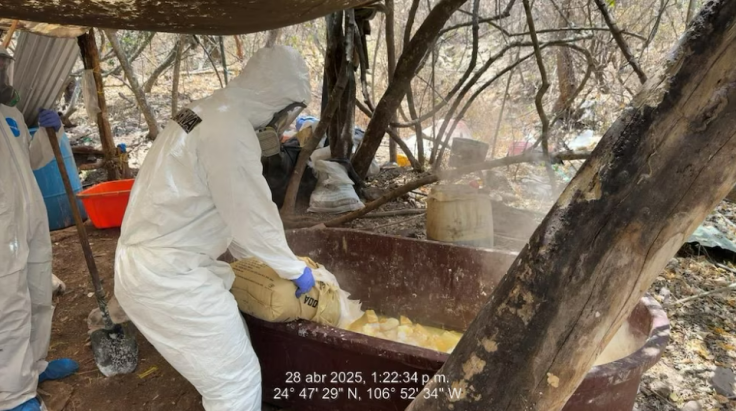
Guatemalan authorities say the Sinaloa Cartel, with support from local gangs, controls most of the clandestine drug laboratories in the country that produce synthetic drugs such as fentanyl and methamphetamine.
According to the National Civil Police (PNC), 27 so-called "narco labs" were dismantled in 2024. Of those, 19 were directly linked to the Sinaloa Cartel, and most were operated by the Huistas, one of Guatemala's most powerful drug trafficking groups.
According to PNC information obtained by El Sol de México, the Huistas have worked with the Sinaloa Cartel for decades, cultivating poppy and coca leaves used in heroin and cocaine production. The group also assists with drug storage and trafficking routes into the United States.
The Huistas control key territory along the Mexican border and are led by Eugenio Darío Molina López, also known as "Don Darío," who is believed to oversee all of the organization's operations, according to InSight Crime.
Traditionally, the Huistas have acted as transporters, moving cocaine and other narcotics from Guatemala into Mexico. But officials say the group has expanded into synthetic drug production and is now importing precursor chemicals from China. It also controls poppy cultivation for heroin in Guatemala's mountainous regions.
In recent years, Guatemalan officials have reported an increase in Mexican nationals entering the country to train local groups on how to set up and operate drug labs.
So far in 2024 12 Mexican nationals have been arrested in Guatemala for alleged ties to clandestine laboratories, the Guatemalan Attorney General's Office said.
"The cartels don't come here directly, but they hire experts and send them as trainers to set up and operate drug labs, including those used to process fentanyl," said Belteton Helver Saia, former head of anti-narcotics intelligence for the Guatemalan National Civil Police.
Mexico has reported a record number of Guatemalan nationals arrested for alleged involvement in organized crime. In 2024, Mexico's Attorney General's Office reported 26 such arrests — the highest number on record. Similarly, the number of Guatemalans killed in clashes between Mexican cartels also hit a record high this year, with 17 deaths reported.
Although Guatemalan authorities have long been aware of the Huistas' ties to the Sinaloa Cartel, new intelligence suggests the group has also formed links with the Cártel Jalisco Nueva Generación (CJNG), particularly after the arrests of Joaquín "El Chapo" Guzmán and his sons, Ovidio and Joaquín Guzmán López.
Helver Saia said the CJNG has been gaining influence not only with the Huistas, but also with MS-13 and Barrio 18 gang members operating in Guatemala. Unlike the Sinaloa Cartel, CJNG has focused on recruiting former Guatemalan special forces soldiers — known as Kaibiles — and sending them to Mexico to train cartel members.
© 2025 Latin Times. All rights reserved. Do not reproduce without permission.






